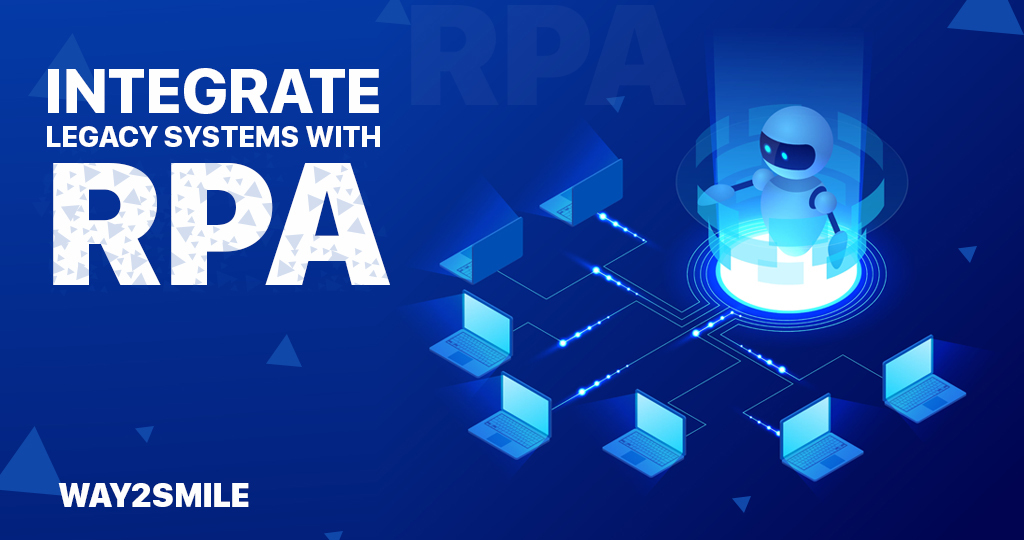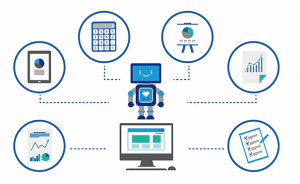Why is it essential to integrate Legacy Systems with RPA?

Robotic Process Automation is the latest trend in the digital industry which is adopted by most of the popular enterprises. Furthermore, many organizations still have a large inventory of green screen, mainframe legacy applications that cannot be integrated through API, and for which RPA is the ideal solution.
Since every business is loaded with multiple business operations, there should be a technology that can make the business process easier. RPA is one such noteworthy solution which most businesses have come forward to implement.
In this blog, we have discussed the need for integrating Legacy Systems with RPA Technology Solutions and how it could benefit businesses.
Integration of Legacy Systems with RPA:
In today’s world, it is essential for companies to be flexible and ready to handle seamless changes happening in the business environment. In particular, legacy systems are the ones that hold the enterprise data.
Since it is very difficult to manage massive volumes of data, automation can be a perfect choice. RPA allows businesses to connect core solutions and eliminate mechanical tasks that involved employees work in legacy systems.
This is also one of the cost-effective ways to implement automation in this modern era. This can be represented in terms of coming up with an application that manages Cloud, ERP, CRM, APIs, etc in a single place.
Here are the advantages of working with such an application:
- An unlimited number of data recognitions for every time usage.
- Ability to manage CRMs in the legacy systems.
- Documents can be processed 24*7.
- Once the task is done, robots can move with working on the next tasks.
- If any modification needs to be done, it is completed after a couple of hours.
Automating data integration is a challenging task that can be done with RPA. The thing here is humans are performing data transfer tasks where RPA plays a major role. RPA makes the process potentially easier.
This can be both a short and long-term option to go with. When it comes to RPA bot implementation, the process happens instantly with higher compliance and data quality. Furthermore, RPA is here to resolve the Legacy System integration challenges hassle-free.
A study by ISG states that RPA implementation would result in 37% of cost savings. Retail is one such industry that has seen a great raise. The reason is it offers omnichannel retail integration. Added, Invoicing is the strong use case to show its power. Since a company receives an invoice in various formats such as PDFs, Docs, Paper Copy, etc, the finance team of the company has to transfer all the invoices to the database of the company. The challenge here is to handle all the invoices in a single place.
This is actually a tedious process since it requires massive human force. Added, unstructured data in the invoicing process will lead to redundancy thereby producing errors. RPA solutions can automate the entire process, sort out errors, and provide an effective decision-making process. Thus, businesses are getting in touch with IT Consulting Companies to implement RPA .It can result in faster outcomes and an error-free invoicing process. In addition to the Retail industry, Supply Chain Management (SCM) comes the next foredeal sector with RPA.
For instance, if a supplier wants to materialize the purchase order, the plan can be created by considering various factors such as:
- Sales History.
- Price Trends.
- Sales Target.
- Seasonal changes.
And much more. The major problem here is collaborating and working on loads of data. But RPA reduces the time taken for the business operation and also the number of errors.
Read Also – How to build a successful IoT business model? 5 Instant Steps you should know
Why RPA can be a perfect choice to be considered?
It is true that RPA bots can accomplish repetitive and everyday tasks in an efficient manner. Added, when it is integrated with Machine Learning, can bring in multiple opportunities. The adoption of Robotic Process Automation can bring dozens of benefits to enterprises.
Machine Learning when implemented with Artificial Intelligence can associate and facilitate the tasks performed by RPA bots. One of the best examples is having and dealing with unstructured data. On implementing RPA, the but will fetch a set of rules from the most common fields and labels & make use of learning obtained in future scope.
It can make business operations faster by automating. Machine Learning can bring in business knowledge of historical data and also offer business insights on them. Business insights can help enterprises to make easy decisions.
To put it simply, RPA and ML can introduce a smart agent to make the process hassle-free. Thus, businesses that are looking to make profits can get started by adopting Robotic Process Automation which can be integrated with legacy systems.
Read Also – Incredible Benefits of RPA that will Power Up your Business
Here are the major benefits of upgrading Legacy Systems with RPA:
- Enhanced Security
RPA doesn’t deal with data and access to security risks with the replacement of legacy systems. Automation allows enterprises to control access authorization to sensitive information.
- Cost-Effective
When compared to other systems that require integration through API, RPA implementation is simple and easy to be done. It also doesn’t require many human resources and is scalable to various operational needs.
- Faster Implementation
Implementing RPA would not be a major problem. The reason is, it doesn’t require complex coding strategies or any sort of integration. Deployment is made easy which allows businesses to deal with new opportunities with higher productivity.
Conclusion:
Undoubtedly, the answer would be “Yes”, it is essential and easy to integrate Legacy Systems with RPA. In order to cut down the additional costs and business risks, businesses can go with implementing Robotic Process Automation efficiently.
If you are one such business looking to make the process operations easier, we as one of the Digital Transformation Companies are here to help you out. Our experts have a very good knowledge of RPA and can guide you towards the right path!
Get in touch with us by contacting us!
Read Also – Impact Of RPA & AI In Transforming Agricultural Sectors At Present



